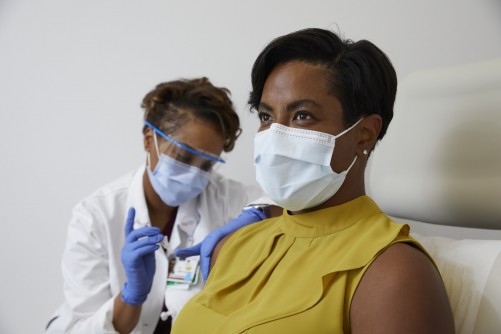Stacy Tarradath, MD, medical director of Urgent Care at Cedars-Sinai, gets her flu shot from nurse LaTasha Columbus, LVN. Courtesy of Cedars-Sinai
This year's flu season won't be like any other, due to the ongoing COVID-19 (coronavirus) pandemic. Because the flu and COVID-19 can present in similar ways, anyone who experiences overlapping symptoms of the two viruses may have to assume it's COVID-19 unless testing is performed, according to Cedars-Sinai experts. Even more concerning is how a surge of flu patients could affect the nation's hospitals, which already are grappling with patients affected by the novel coronavirus.
"Hospitals always get an influx of flu patients in the winter months. If enough people develop a severe case of the flu and need to be hospitalized, that influx of patients could overwhelm the healthcare system," says infectious disease specialist Jonathan Grein, MD, director of hospital epidemiology at Cedars-Sinai. "We're trying to avoid a so-called 'twindemic.'"
So what's the best way to protect yourself and your community from the flu? Get a flu shot – as early as possible.
"It's the most powerful tool we have to fight the flu," Grein says.
Flu season usually begins in early November. It's best to get the flu shot promptly, advises Stacy Tarradath, MD, division chief of Urgent Care at Cedars-Sinai, because it takes a couple of weeks for the body to build up immunity.
The influenza vaccine greatly reduces your risk of catching the flu, Tarradath explains, and if you do become ill, it helps reduce the severity of illness. It also could help you avoid a scenario in which you come down with symptoms of the flu and must self-isolate for at least 10 days unless you receive a negative COVID-19 diagnosis.
"It's better to get the vaccine early to maximize your protection in case the flu season starts early," says Tarradath.
Cedars-Sinai is offering safe and convenient options for getting your flu shot during the ongoing COVID-19 pandemic. Contact your Cedars-Sinai primary care provider to schedule your shot. If you're not already a Cedars-Sinai patient, call 1-800-CEDARS-1 to establish care with a physician.
"We continue to observe strict safety measures at our outpatient sites," Tarradath says. "We want patients to feel safe and comfortable visiting us to get their flu shot."
Those precautionary measures include:
- Performing temperature checks for all those entering Cedars-Sinai facilities.
- Rapidly identifying and isolating patients with potential COVID-19.
- Requiring masks for all employees, physicians, patients and visitors.
- Physical distancing in waiting and clinical areas.
- Limiting visitors.
- Designating specific zones for COVID-19 patients, separating them from other patients as appropriate.
- Increasing thorough cleaning and disinfection for all common areas and clinical spaces.
- Minimizing the number of staff and patients in clinical settings to ensure physical distancing, while using telemedicine options, including video visits, to provide care remotely for many medical needs.
Some people avoid getting the influenza vaccine because they think it can make them sick with the flu, which Grein says is a myth. Flu shots are made with either inactivated virus, or with only a very small amount of the flu virus. The nasal spray version of the vaccine does contain live virus, but it has been weakened so that it will not cause illness.
"The symptoms some people might feel after getting the flu shot represent your body’s immune response to the vaccine," he says. "It’s a similar immune response that you might get to the flu, though much milder."
Other than the flu shot, the best way to protect yourself from the flu is by following the same safety measures to prevent the spread of COVID-19: frequent hand-washing, physical distancing, wearing a mask and avoiding people who are sick.
"Both influenza and the novel coronavirus spread in similar ways," says infectious disease specialist Soniya Gandhi, MD, associate chief medical officer at Cedars-Sinai Marina del Rey Hospital. "So if people really follow the same precautions we've been urging for COVID-19, we could see a double benefit."
Gandhi explains that we all have a responsibility to do our part to maintain capacity in our hospitals for patients who most need medical care.
"While there currently is no vaccine for COVID-19, there is a vaccine for the flu. If enough people get the flu shot, it can make a big difference," Gandhi says. "We're counting on everyone to help us maintain our capacity so we can continue serving the community."
Source: Cedars-Sinai

Be the first to comment on "Why It’s More Important Than Ever to Get Your Flu Shot This Year"